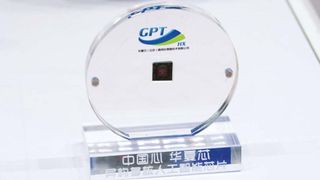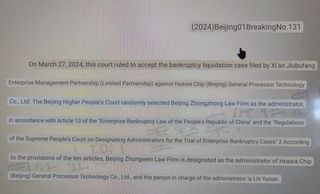Award-winning Chinese processor design company Huaxia Chip files for bankruptcy — firm’s CPU, DSP, GPU, and AI processor IPs in limbo
Huaxia Chip holds more than 100 patents.

Huaxia Chip was a rising star among China’s original computer processor intellectual property (IP) designers. However, despite a voracious appetite for all things IT, the company now appears to be bankrupt and set to be liquidated. Obviously, something must have gone wrong, and machine translations of various Chinese news reports hint that the courts will find “dishonest persons subject to execution.” Don’t worry though, as we looked more carefully at the original wording and translations, and the people involved will more likely face consequences such as equity and trading freezes – nothing fatal.

It is highly likely that China’s Huaxia Chip was an important part of the country’s homegrown computer chip industry. It claimed to have completely independent intellectual property rights to CPU, DSP, GPU, and AI processor IPs. That is a bold and expansive claim, but its specialism seemed to be in robotics, edge, IoT, and cloud computing fields. Huaxia was placed in the top five Chinese innovative IC design companies in the 2020 China IC Design Achievement Award and it won the 2020 Hard Core China Chip Most Potential IC Design Enterprise Award.
The firm maintained its headquarters in Beijing and R&D and sales centers in Shanghai and many other China tech hub locations. However, looking at its English-language website, the company became relatively quiet after 2018.
With all the above in its favor and China thirsty for homegrown tech in the face of ratcheting U.S. sanctions, it is hard to understand how Huaxia Chip fell from grace. The source reports and court statements aren’t very enlightening. Huaxia seems to have folded after being challenged by Xi'an Jiubufang Enterprise Management Partnership's lawsuit. We know that, for years, an alleged graft scandal has plagued Chinese business development, and juicy government-backed investment funds targeting the semiconductor industry are ripe targets. However, we don’t have enough information to say for sure if such underhand business practices were to blame for the bankruptcy of Huaxia.

Reading the various reports, people involved in Huaxia’s business seem to be under close scrutiny, have had their assets and equity frozen, and will not be able to trade stocks. We guess this could change subject to the outcome of the court case. Huaxia Chip looks set for liquidation, and the government will probably be keen to get this process over with ASAP, as the firm holds more than 100 patents which could be important to the country’s semiconductor and chip development hopes.
Stay on the Cutting Edge
Join the experts who read Tom's Hardware for the inside track on enthusiast PC tech news — and have for over 25 years. We'll send breaking news and in-depth reviews of CPUs, GPUs, AI, maker hardware and more straight to your inbox.

Mark Tyson is a Freelance News Writer at Tom's Hardware US. He enjoys covering the full breadth of PC tech; from business and semiconductor design to products approaching the edge of reason.
-
ivan_vy looks like more like a management problem and not a tech problem. someone mismanaged their resources, it's not enough to be an award winning leader, need to stay on top and survive as a company.Reply -
thisisaname There is a lot going on here and we are likely not going to hear all of it.Reply
Odd it won awards in 2020 but became very quite in 2018, some things does not add up with that.
This looks very political. -
artk2219 Reply
Agreed, it looks like they made an enemy of someone and it came crashing down on them.thisisaname said:There is a lot going on here and we are likely not going to hear all of it.
Odd it won awards in 2020 but became very quite in 2018, some things does not add up with that.
This looks very political. -
bit_user Reminds me of the promising Japanese supercomputing company, PEZY Computing. From Wikipedia:Reply
"In 2015, computers using PEZY processors occupied the top 3 slots on the Green 500 supercomputer list ...
In December 2017, PEZY President Motoaki Saito, and PEZY employee, Daisuke Suzuki, were arrested on a charges of fraud – that is – padding expenses claims to Japan's New Energy and Industrial Technology Development Organization (NEDO) to the amount of $3.8 million. In January 2018, further criminal activity was reported as being under investigation by the Tokyo District Prosecutor's Office – that is a further ¥191 million extracted illegally as subsidies. In July 2018 Daisuke Suzuki received a suspended prison sentence of three years, for his involvement in the fraud - was found to have played a minor associative role to Saito."
I think the supercomputing sector (particularly in Japan) is heavily government-subsidized, making it somewhat ripe for fraud. It's a real shame, because it seemed like they had some good tech, too!
I wonder if the semiconductor industry in China is also a popular target for fraudsters, for similar reasons.
Most Popular



